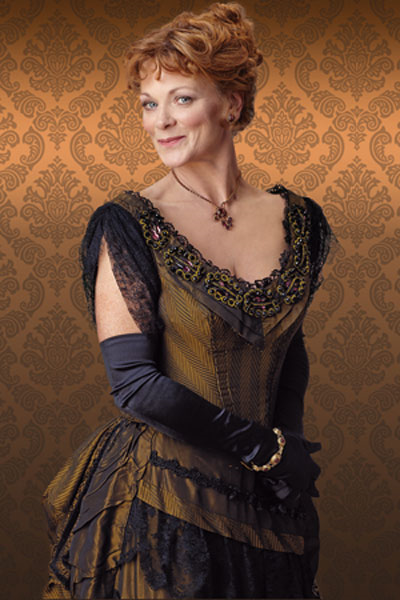An Ideal Husband
So how should we regard the delectable Mrs Chevely, with her arch looks and glittering Lamia gown so wonderfully nuanced by Ms Bond? Lord Goring has no doubt.
‘She looks like a woman with a past, doesn’t she?
Most pretty women do. But there is a fashion in pasts just as there is a fashion in frocks. Perhaps Mrs Chevely’s past is merely a slightly décolleté one, but they are extremely popular nowadays.’
So is she a clever but dangerous woman who lacks any scruples to get what she wants, an adventurer, a dangerous seductress, a victim?
‘Oh I should fancy Mrs Chevely is one of those very modern women who find a new scandal as becoming as a new bonnet, and air them both in the park every afternoon at five-thirty.’
Bored, frustrated and manipulative, her intelligence and sexuality are but instruments in a game of power and influence. She seems so far into it that she has forgotten how to feel.
‘She wore far too much rouge last night, and not enough clothes. That is always a sign of desperation in a woman.’
She blackmails Sir Robert Chiltern into protecting her investments by threatening to expose him. She has in her possession a letter proving that His Majesty’s Foreign Secretary kick started his career by selling secret government plans to a speculator.
‘I think that in life, in practical life, there is something about success, actual success, that is a little unscrupulous; something about ambition that is always unscrupulous.’
But Sir Robert’s young wife, as beautiful as she is uncompromising, has put her husband on the fourth plinth, making it perfectly clear that her love for him is purely a projective identification of one with perfect morality.
‘I remember having read somewhere that when the gods wish to punish us, they answer our prayers.’
In so doing, her principles damage Sir Robert far more then the bribery and manipulation of Mrs Chevely could ever do.
‘And is Lady Chiltern as perfect as all that? What a pity!’
Sir Robert cannot face telling his wife the truth. He knows it would destroy their marriage. Mrs Chevely knows this and is prepared to destroy both his career and his marriage.
The fact is we all have our dark sides, the things we are ashamed of. It never does to have such high principles (one wonders what is being defended).
‘Well, the English can’t stand a man who is always saying he is in the right, but they are very fond of a man who admits he has been in the wrong. It is one of the best things in them.’
Lord Goring is the catalyst in Oscar Wilde’s wittily observed play (The Ideal Husband). He’s rather like Falstaff or the wise court jester, but in this case it is the dandy philosopher, brilliantly played by Eliot Cowan. He enters as a louche and dissolute character, but he understands the flaws of human nature; everybody is capable of doing wrong.
‘Nobody is incapable of doing a foolish thing. Nobody is incapable of doing a wrong thing.’
Idealisation is a very fragile basis for marriage. Acceptance and forgiveness are more important. As Sir Robert complains:
‘Why can’t you women love us, faults and all? Why do you place us on monstrous pedestals? We all have feet of clay; men as well as women, but when we men love women, we love them knowing their weaknesses, their follies, their imperfections, love them all the more for that reason. It the imperfect, not the perfect who have need of love.’
But is it that gender specific?
An Ideal Husband, probably Oscar Wilde’s best play, is currently at the Vaudeville Theatre in the Strand and stars Samantha Bond, Rachel Stirling and Eliot Cowan. It doesn’t deserve a half empty house.



